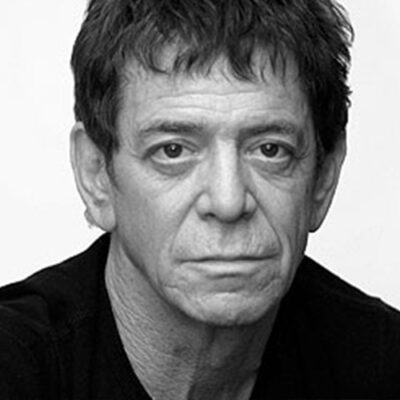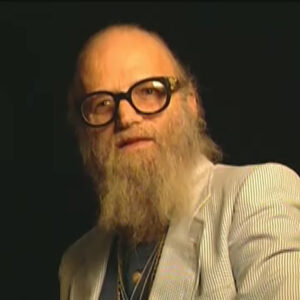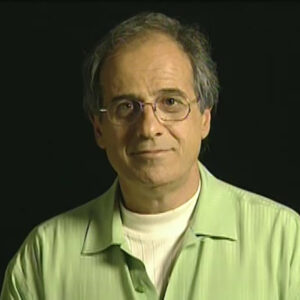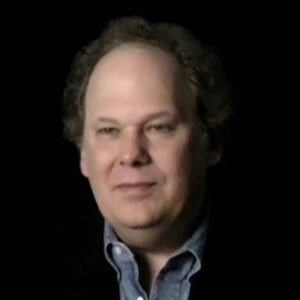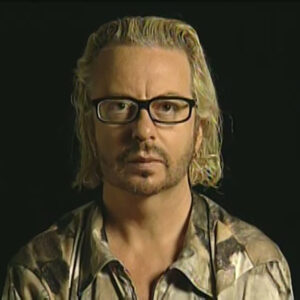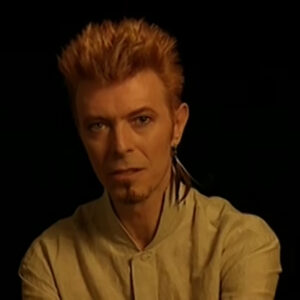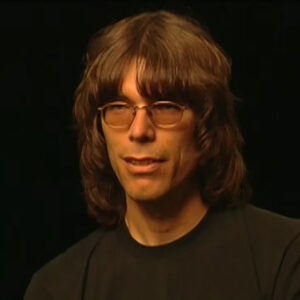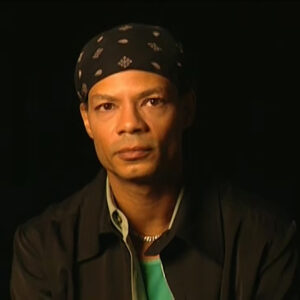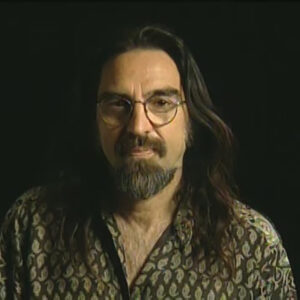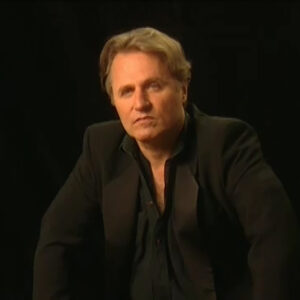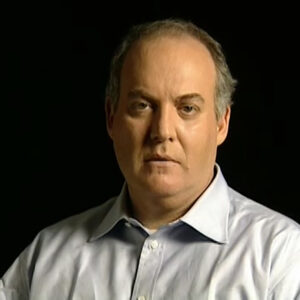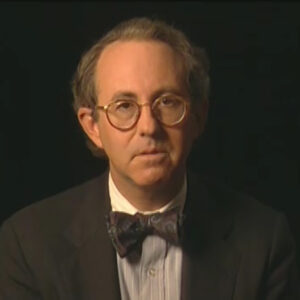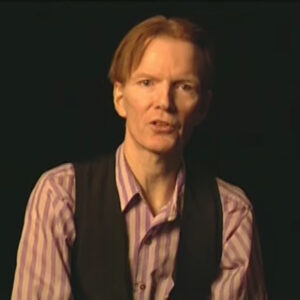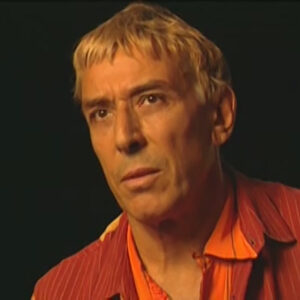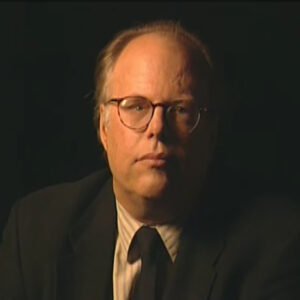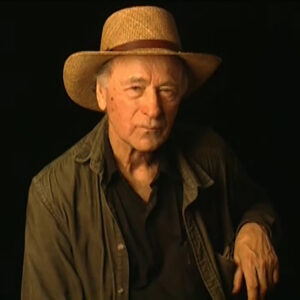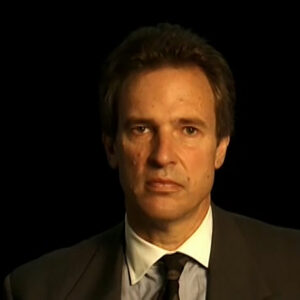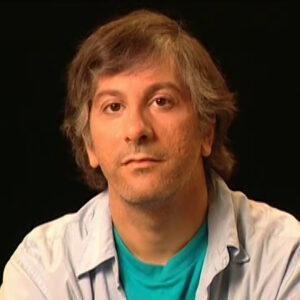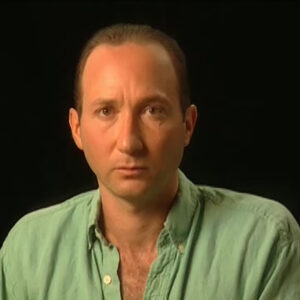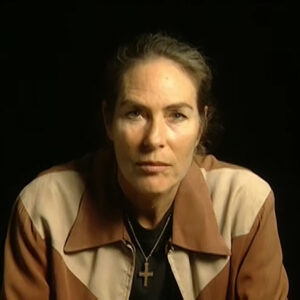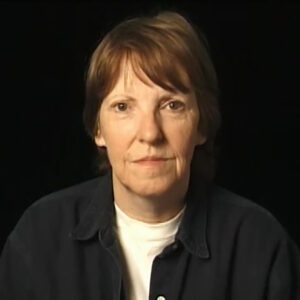Speaker Getting involved with the factory was, first of all, getting involved with Candy, Darling, and of course, leaving Miami and my parents and, you know, we to, you know, wanted no part of they didn’t understand me.
Speaker And yes, I got hit by lightning and I hitchhiked to New York City. And I, you know, like everybody else, I hustled I sold my my body and did drugs and stuff. And then I’ve met Candy darling Jackie Curtis, and they told me about this fabulous artist called Andy Warhol. And I was at that time, I was I was working on getting a sex change. So I was living with this guy in Brooklyn for five years. And, you know, and Candy and Jackie would you know, I called me, I was darling and I would be turning to me a movie star is when you know you’re working for MGM, you know, not not some schlock person, you know, that’s doing, you know.
Speaker Campbell’s Soup can.
Speaker Yes.
Speaker And so finally, they did this movie called Flesh, and my boyfriend threw me out because he found me cheating. So, you know, so off I was, you know, from Brooklyn. And I started hanging out in Max’s Kansas City with, you know, Candy Darling and Jackie Curtiss.
Speaker Unsign. We are aware of, of course, Andy Warhol, you know, and and Paul Morrissey and, you know, and we of course, we were all doing drugs. And we I was there when drugs were fabulous. I would never, never, never quit. And now but anyway, so at one point I was being interviewed for this magazine and they asked me, well, what do you do? You know, I was I was in this theater group called the Playhouse of Ridiculous. And I said, well, I’m an Andy Warhol superstar, you know? And I had just met Andy Eisley. I didn’t meet him. I had I met his hair. You know, he had this if you think this this hairdo is fabulous, you should’ve seen that that that tuft of hair, you know, it looked like a jack, you know, from the Himalayas. And he said, well, you know, what’s your name? I said, Harley. And he said, Don’t you have a last name is Sydney. And that night, whole Rene Ricard, who was involved with Andy and a whole bunch of us and Silver George, we went home and did drugs and we watched this episode of I Love Lucy where she’s got this thing on her head. You know, what do you call those loving cup? And behind her, she’s she’s lost on the subway and behind her it says Woodlawn. And we all went shopping. You know, those are the little things that, you know, light up, you know, like cartoons. Holly Woodlawn. So, you know, my name was, you know, was born. So next time I saw Andy, anyway, they called me up. They said, you know, we’re doing this movie called Treach. Are you interested? I said, Jack, I will be modest. And with Jordan, Sandro and.
Speaker I got off I got off the beaten path, and it has nothing to do with Lou Reed now, but it will eventually get there, I promise you’ll believe me anyway. So that’s how I got involved with Andy and the whole troop. And I met Joe, who I was. Oh, God. Oh, you scared the hell out of me.
Speaker It took years before I finally just, you know, thought that he was like I was always a nice guy, you know, but I’m so intimidated by him.
Speaker Oh, tell me about what it was like.
Speaker Come on, ask me questions, because otherwise I’m just going to live forever like trash.
Speaker How many days was it? Was this.
Speaker Well, OK, I’m trash. It took like about five, six days. I mean, actually, I was I was asked to like, do one day’s work and somehow pull Morseu. Who was directing? I mean, at that point, you know, this was after Andy got shot and after Andy got shot, the entire you know, it wasn’t the factory anymore. It became a business. I you know, it was completely different. And so he took care of all the filming, you know, and Joe was like the major, you know, Mr..
Speaker It started with just, you know, the fact that I had the nerve to like, say I was an Andy Warhol superstar and this thing and they said, well, you know, she’s she’s a lunatic. My you know, I hire her, as I said, derelict. I mean, the thing is, we were all derelicts at that time. We were all on welfare. We used to go to Mexico City at five o’clock and eat chicken wing. I mean, before buffalo wings high waist wouldn’t give up anyway. I mean, that’s how we supported ourselves. So anyway, so I said, well, let’s hire her. So I did one day’s work and obviously Joe and I got very, you know, got along together and said and there was a rapport there. So it went on and on and on and on and on and the movie.
Speaker So it wasn’t really scripted too much. You know, you had this good day and then all of a sudden they brought them together again.
Speaker No. Yeah, it was I mean I mean, the wonderful thing about it was that, you know, there was no script. You know, Paul just said, you guys go to it and we did it. And it was wonderful.
Speaker And a little bit also about Mexicans. About what? Just to give us a sense of what the scene was like.
Speaker Oh, please, Max. Well, first of all, OK, Jim, the other night I was like three o’clock in the morning. I turn on television because I still have that New York thing I need to hear, you know, noise. And there’s the Jim Morrison story with what’s his name. But yeah, Jim and I, Jim, one night we went into a place of ill repute. Yeah. And we had, you know, sexual contact. That’s as far as I get. I mean, I have to his memory, my God, you know, can you talk about Max? Oh, Max’s Kansas City. Well well OK. First of all, I mean, I’m God, please. Who was there? I mean, you would like, crawl in. I mean, it was, you know, Sylvia Miles would be in the front screaming, Darling, I love you. And then you go through the bar and then in the back there’d be, let’s say, Andrea, Andrea Feldman, you know, on top of tables with her, you know, skirt lifted up and screaming that I miss Warhola. And then there’d be like Janis Joplin over here. There’d be verruca over there. It was like, you know, and it was like the most insane place in the world. And it was all red. So everyone looked good. And then upstairs, oh, we don’t even want to start with that.
Speaker Tell us about. Oh, dear, please. I am the end of a child that was born of. A telephone booth. I don’t want to go into that.
Speaker What makes this Kansas City was I mean, it was it was everybody was there.
Speaker I mean, Sylvaine Miles, I mean, John Slazenger, Janis Joplin. They were every model in the world. It was Barouch. God, there was Twiggy. I mean, and of course, you know Jim Morrison at one table. And of course, and he had his own table and, you know, with and everyone else in it. And, of course, Lou, are a conglomeration of, you know, every every energy and every power within every one. You know that you know of the 60s and 70s where we’re in the back room. And there I was. With all these fabulous people.
Speaker Beautifully said, much better.
Speaker I bet I was thinking and thinking, well, I had to get the first one out and then I cut. Yeah. Oh, we have the other version. We have the European version.
Speaker OK, yes, please. The next question, I don’t think it will run on the next distractingly.
Speaker So tell me about this disturbance of the inside at Max. What was the outside of? What was. Tell me about New York at that point. We’re talking about the. I guess it’s too late, 60s, early 70s. What was the energy of New York? What was it like being Hollywood guy walking around New York?
Speaker I got. Accept, no, no, no filth, you know, so free, gotcha. All right. OK, go ahead.
Speaker So what was it like for the outside? What was the scene here was this intense scene inside Max’s but what was New York like then?
Speaker Well, first of OK, 1969, you know, I mean, the energy the energy was so immense. You know, I’m not only talking about drugs, just the fact that there was so much creativity.
Speaker I mean, just creativity alone was just like blazing.
Speaker And Max’s Kansas City was that one little, you know, like where everyone went to and and then, you know, they were know there were all these disco, you know, it was the disco era.
Speaker And it was just like just it was all like this. But it wasn’t crazy. It was just creative. It was fabulous. It was divine. And it all like centered around that one little area called Max’s Kansas City and Andy Warhol and the people around Andy Warhol.
Speaker I mean, I’m not saying I mean, you know, Andy, I will, you know, always love him. You know, if it wasn’t for Andy, I wouldn’t be here.
Speaker But the people that he is, you know, it’s like the sun and the planets. We were all the planets. And that how New York was in the 60s and 70s, it was amazing. I mean, energy.
Speaker Can you talk about now how does long walk on the wild side in a sense, gave a definition to these people, these people being transvestites, hustlers, the sort of crowd that was really your crowd there?
Speaker Well, the thing about Lou and Lou, for first of all, I mean, God, you know, he was the Velvet Underground. And you know, any of his songs, Femme Fatale was my first, you know. But the fact that he just, like, clicked on to all of us. And our lives and told everybody that we were just. Human people, I don’t know why he was saying, I know is it just, you know, worked and he understood because he was there, you know, and also talk about and the fact that here’s here’s someone who writes this about you.
Speaker What was it like being you being Hollywood?
Speaker What was it like being this? One of these characters in this song, there was a world famous song all of a sudden. What was that like?
Speaker It was weird because first of all, like, you know, I it came out and, you know, and I know it and say, you know, what do when walking the walk on the wild side of the wall, said, you know, Holly came from Miami. If I can, I can I can even imitate him. So tired of Holly came from Miami. Yeah. Yesterday I met this person. Who are you? The Hollywood lawn in Wakanda, as I said. Yeah, he said, oh, well, that and I had to sign his tie. I said, yeah, well, you you know. Did you really put me please? But the thing is, the one thing about that song is that it will go on forever. Once I was doing this thing, I was doing a documentary called Superstar on Andy Warhol and we were shooting in Santa Monica on the beach. And then, you know, after we got tired, we went to this bar and it was a straight bar. I mean, literally really house, you know, one of them. And I thought, oh, my God, they’re going to be mad at me. And they thought they said, oh, man. Anyway, yes, some some straight men are really stupid, but. They put the song that they played when we were doing Superstar and they played Walk on the Wild Side, knowing what this is to thinking.
Speaker Yeah, and the guy called me ma’am. I mean, I don’t like I for me as I went off the track of the Lou.
Speaker Oh, come on.
Speaker OK, what is the mood there in that song? And you kind of define where he was, how he captured you in a sense in those.
Speaker Well, OK. What I what I think Lou did the entire song, you know, I mean, because I miss Candy and of course, I miss Jackie very much. I mean, they’re gone. I mean, thank God just here, it’s it’s what he said about Andy was, oh, it’s it’s tough and it’s you know, it’s like, you know, you know, when somebody has not only two eyes, but like maybe peripheral vision, you know, like and. Yeah. Plus he’s a nice guy.
Speaker I mean, that wouldn’t hurt that beautiful what you said where he has two eyes and also peripheral vision. Say that again.
Speaker Explain that. That this song.
Speaker Yeah. Well I think about the walk on the wild side is the fact that Lou, not only I mean, you know, I mean, not only does he have two eyes, he also has, like, peripheral vision.
Speaker And he could see he’s surrounded. You could see around him. And he’s he’s he’s an honest, nice guy.
Speaker We lost. So once you do that again, I don’t believe really good.
Speaker And that’s great because we’re in a hotel. Right.
Speaker OK, so if you could just do it again. We’re with Walk on the Wild Side. Lou not only has two eyes, but he really has peripheral vision. Yeah. Tell me when and go on.
Speaker Well, the thing about Lou, God is, you know, not only does he have two eyes, he’s got this peripheral vision that he’s he’s, you know, he sees around him. And that’s what, you know, to me walk on the wild side is about.
Speaker Beautiful. And now you could say a little something about each of the people that they’d like to start with, Candy, and a feeling about what Candy was like.
Speaker Well, the fact that he captured Candy, Jacqui, John and I and was honest about it, you know, it really impressed me. And, you know, I I miss them, you know, very much. But Lou’s here and so was Joe and so am I.
Speaker That was really good. Also, why do you think you ended up in the store and walk on the wild side and you thought, oh, wow.
Speaker I think the reason I. Because I think the reason I ended up in Walk on the wild side because I hadn’t I, I never met Lou that I was attracted I was attracted to his music always. I mean, you know, femme fatale. I mean, his early stuff with Nico I loved. I just think that at that point he was. Just writing, I mean, he was like, I don’t know and, you know, I tried I spoke to him, but I think it was like, you know, like getting away and, you know, and and just, you know, when you, like, write about stuff that’s happening and you don’t want to be involved, I think. And that’s what he was doing.
Speaker But I mean, God, you know, this also look at the camera and say, I don’t know why I it you know, but, you know, the things we hold on a second.
Speaker I did. Didn’t I tell you about that the night before? My friend told me about Walk on the Wild Side, my friend Estelle Baude called me up and said, Honey, let me talk.
Speaker I’ve been today and I don’t know him.
Speaker Oh, OK. We can understand. I think your friend told you what the song was on. This is like your first reaction.
Speaker The first time I ever heard about a walk on the wild side. My, my, my my friend Estelle Balde called me up and said, Holly, there is a song by Lou Reed called Wakanda Outside and they’re playing it all the time. Turn on your radio. I don’t have a radio turn on. I don’t have anything. I’m in the garage now. So I called up a friend of mine and I said, Have you heard? The song is called Walk on the Wild Side by the End. But the thing is, the night before I was staying at a friend’s house and we were watching this movie called Walk on the Wild Side with Capucine and Jane Fonda. And then the next day, Isdell calls me up and says, you’re one walk on the wild side. No, I’m not here. I did not do Naboo now. Anyway, that’s that’s how I heard about it. You heard about it through a friend? Yeah. Yeah, she. She called me up and said, you’re in what can. Well, I don’t know dear. If I was a woman once, I would have I would not be living in the gutter. And I know I did not act with Cappucino or Jane Fonda.
Speaker And she said, no, no, it’s low paid. And just saying that you came from Miami and you shave your legs, that you plug your eyeballs and you’re not a drag queen. I’m suing.
Speaker But you know what, I called them up and I said, honey, I love you. Yeah, I. What an honor. What an honor.
Speaker So what was it like being in the top 10?
Speaker So, I mean, wasn’t forever. Oh, my God. Not only that, I turn on the television and Live Aid and he opens with Holly. Came up. Oh, oh, oh. I’m having I’m having a seizure. I couldn’t believe it. And it’s just no films go in and out and they’re out and, you know, and and they get, you know, moldy, but a one outside is going to last forever. And young people, I mean, like trash and everything that I have done, all that stuff, they go, oh, but when I when they find out that Holly came from Miami, L.A., hitchhiked across the USA, plucked her eyebrows on the way and shaved legs and he was just she and you are then it’s like, oh la la la la la. Then it’s, you know, open season. Yeah. Thank you, Lou. I love you.
Speaker That’s beautiful. Can I have.

